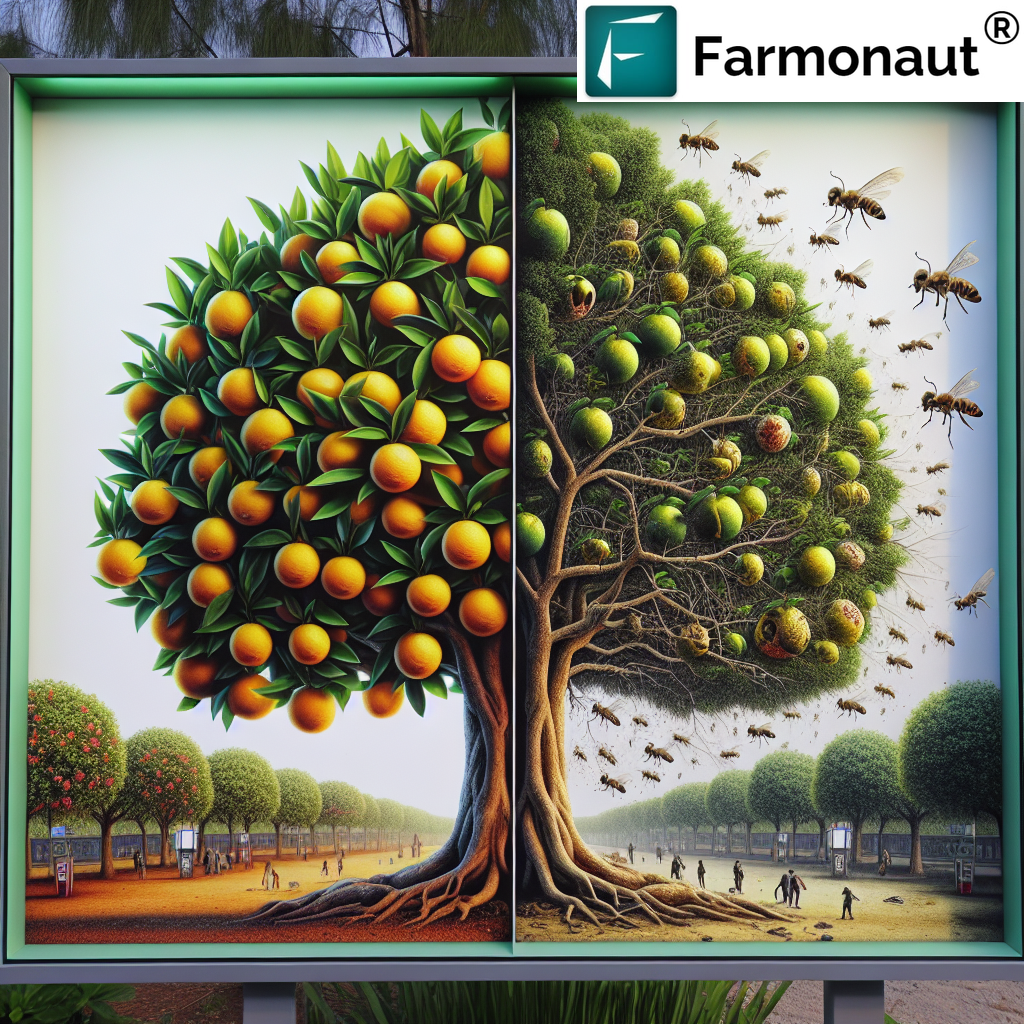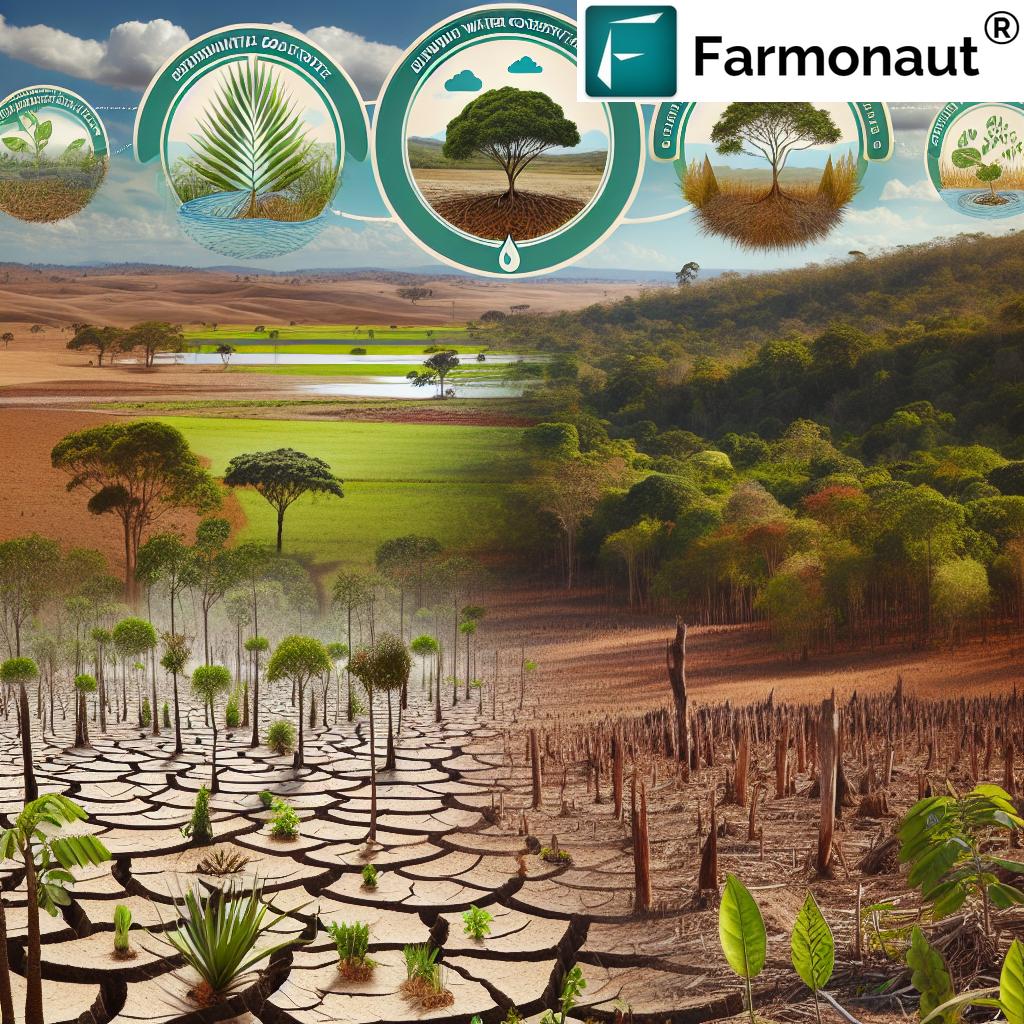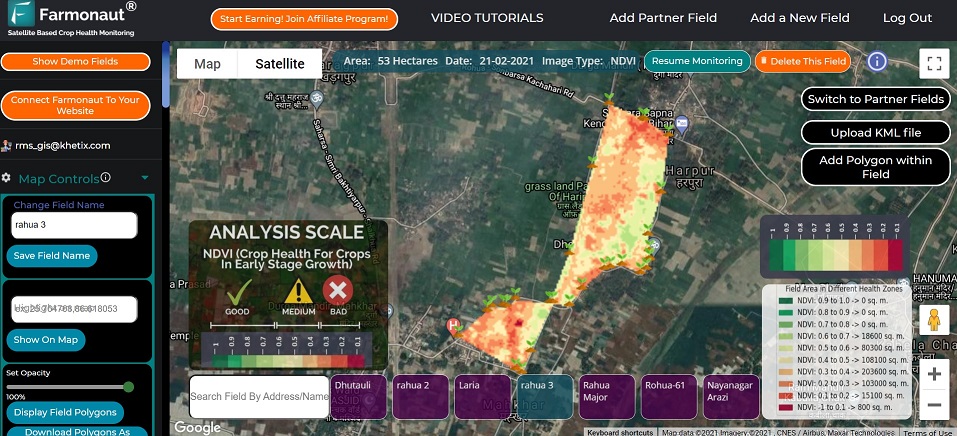Sustainable Farming: Protecting Bees and Boosting Crops with Eco-Friendly Practices
“Sustainable farming practices can increase crop yields by up to 30% while supporting bee populations.”
Welcome to our comprehensive guide on sustainable farming practices that protect bees and boost agricultural biodiversity. In this blog, “Bee Safe – Bee Careful,” we’ll explore eco-friendly approaches to crop protection and pollinator conservation, essential for maintaining a healthy farm ecosystem. As experts in agricultural technology and sustainable farming, we at Farmonaut are committed to helping farmers integrate innovative solutions that balance productivity with environmental stewardship.
The Importance of Bees in Agriculture
Bees play a crucial role in our agricultural systems and natural ecosystems. These tiny powerhouses are responsible for pollinating a significant portion of our crops, contributing to both food security and biodiversity. However, bee populations worldwide are facing numerous threats, including habitat loss, pesticide exposure, and climate change. As stewards of the land, we farmers have a responsibility to protect these vital pollinators while maintaining productive and profitable farms.

Bee-Friendly Farming Methods
Implementing bee-friendly farming methods is a win-win situation for both farmers and pollinators. Here are some key practices that can help protect bees while boosting crop yields:
- Diverse Crop Rotation: Implementing a diverse crop rotation system helps maintain soil health and provides a variety of food sources for bees throughout the growing season.
- Cover Crops: Planting cover crops, such as clover or vetch, between main crop cycles can provide additional forage for bees and improve soil structure.
- Hedgerows and Wildflower Strips: Creating natural habitats around field margins with native plants offers nesting sites and food sources for bees and other beneficial insects.
- Reduced Tillage: Adopting minimal or no-till practices can help preserve ground-nesting bee habitats and improve soil health.
At Farmonaut, we understand the importance of these practices and offer tools to help farmers implement them effectively. Our satellite-based crop health monitoring can assist in managing diverse crop rotations and assessing the impact of cover crops on soil health.
Safe Insecticide Use in Agriculture
While insecticides can be necessary for crop protection, their use must be carefully managed to minimize harm to bees and other beneficial insects. Here are some guidelines for safe insecticide use:
- Integrated Pest Management (IPM): Implement IPM strategies that prioritize non-chemical pest control methods and use insecticides only as a last resort.
- Timing of Application: Apply insecticides during times when bees are least active, typically early morning or late evening.
- Selective Products: Choose insecticides that are less toxic to bees and target specific pests rather than broad-spectrum products.
- Precision Application: Use precision application techniques to minimize drift and reduce the overall amount of insecticide used.
Farmonaut’s Jeevn AI Advisory System can provide real-time insights on pest pressure and optimal timing for interventions, helping farmers make informed decisions about insecticide use.
Organic Pest Management for Crops
“Organic pest management strategies can reduce harmful insecticide use by 80% in bee-friendly farming.”
Organic pest management is a cornerstone of sustainable farming and bee protection. By adopting these practices, farmers can significantly reduce their reliance on synthetic pesticides:
- Biological Control: Encourage natural predators of crop pests by creating habitats for beneficial insects.
- Trap Crops: Plant species that attract pests away from main crops, reducing the need for chemical interventions.
- Pheromone Traps: Use species-specific pheromone traps to monitor and control pest populations without harming bees.
- Biopesticides: Utilize naturally derived substances for pest control, which are generally less harmful to bees.
Our API and API Developer Docs provide access to valuable data that can support the implementation of organic pest management strategies.

Integrating Beekeeping with Agriculture
Integrating beekeeping into agricultural operations can provide multiple benefits for both farmers and the environment:
- Improved Pollination: On-site bee colonies ensure consistent pollination services for crops.
- Diversified Income: Honey and other bee products can provide additional revenue streams for farmers.
- Enhanced Biodiversity: Beekeeping encourages the preservation of diverse plant species on and around the farm.
- Educational Opportunities: Beekeeping can serve as an educational tool for farm workers and visitors about the importance of pollinators.
Farmonaut’s technology can assist in managing beekeeping operations by providing insights on floral resources and optimal hive placement based on satellite imagery and weather data.
Eco-Friendly Seed Treatments
Seed treatments are an important aspect of crop protection, but traditional chemical treatments can pose risks to bees. Eco-friendly alternatives include:
- Biological Seed Treatments: Using beneficial microorganisms to protect seeds and seedlings from pests and diseases.
- Physical Seed Treatments: Employing methods like hot water treatment or seed priming to enhance seed vigor without chemicals.
- Natural Seed Coatings: Utilizing plant-based substances or minerals to improve seed performance and protect against pests.
Our Android App and iOS App can help farmers track the performance of crops grown from eco-friendly treated seeds, providing valuable data for decision-making.
Balancing Crop Protection and Bee Health
Achieving a balance between effective crop protection and bee health is crucial for sustainable agriculture. Here are some strategies to consider:
- Buffer Zones: Establish pesticide-free buffer zones around crops to protect pollinators.
- Targeted Spraying: Use precision agriculture techniques to apply crop protection products only where needed.
- Alternative Pest Control: Explore non-chemical pest control methods such as mechanical weeding or companion planting.
- Regular Monitoring: Consistently assess bee populations and crop health to make informed management decisions.
Farmonaut’s satellite-based monitoring and AI advisory systems can provide valuable insights to help farmers implement these balanced approaches effectively.
Sustainable Farming Ecosystem Management
Creating a thriving, diverse farm landscape that supports bees and other beneficial insects requires a holistic approach to ecosystem management:
- Habitat Restoration: Restore natural habitats on marginal or unused land to provide nesting sites and food sources for pollinators.
- Water Management: Implement sustainable irrigation practices and create clean water sources for bees.
- Soil Health: Focus on building healthy soils through organic matter addition and minimal disturbance to support diverse plant life.
- Agroforestry: Integrate trees and shrubs into agricultural systems to create diverse habitats and microclimates.
Our web application offers tools to help farmers plan and monitor these ecosystem management strategies, ensuring they are implemented effectively and sustainably.
Bee-Friendly Farming Practices Comparison
| Farming Practice | Bee Protection Level | Crop Yield Impact | Implementation Complexity | Cost Effectiveness |
|---|---|---|---|---|
| Organic Pest Management | High | Positive | Moderate | Medium |
| Bee-Friendly Seed Treatments | Medium | Neutral | Easy | High |
| Responsible Insecticide Application | Medium | Positive | Moderate | Medium |
| Pollinator-Friendly Crop Rotation | High | Positive | Moderate | High |
| Wildflower Margins | High | Neutral | Easy | Medium |
| Integrated Beekeeping | High | Positive | Difficult | High |
The Role of Technology in Sustainable Farming
Advanced technology plays a crucial role in implementing and optimizing sustainable farming practices that protect bees and boost crops. At Farmonaut, we’re at the forefront of this technological revolution in agriculture:
- Satellite Imagery: Our satellite-based crop health monitoring provides farmers with real-time data on vegetation health, helping them make informed decisions about resource management and pest control.
- AI-Powered Advisory: The Jeevn AI system offers personalized recommendations for crop management, taking into account factors that affect both crop health and pollinator populations.
- Blockchain Traceability: Our blockchain solutions ensure transparency in agricultural supply chains, allowing consumers to verify the sustainability practices used in food production.
- Precision Agriculture: By leveraging our technology, farmers can implement precision farming techniques that minimize resource use and reduce the environmental impact of agricultural activities.
These technological solutions not only improve farm productivity but also support the implementation of bee-friendly practices by providing the data and insights needed for effective decision-making.
The Future of Sustainable Farming and Bee Conservation
As we look to the future, the integration of sustainable farming practices and bee conservation will become increasingly important. Climate change, growing populations, and the need for food security will drive innovation in agricultural practices. Here are some trends we anticipate:
- Precision Pollination: Advanced technologies will allow for more precise management of pollination services, optimizing both crop yields and bee health.
- Biodiversity-Focused Farming: There will be a greater emphasis on creating farm ecosystems that support a wide range of species, including various pollinators.
- AI-Driven Pest Management: Artificial intelligence will play a larger role in predicting and managing pest outbreaks, reducing the need for broad-spectrum pesticides.
- Urban Beekeeping: As urban agriculture grows, we’ll see more integration of beekeeping in city environments, supporting local food systems and urban biodiversity.
At Farmonaut, we’re committed to developing technologies that support these future trends, helping farmers adapt to changing conditions while protecting vital pollinator populations.
Conclusion
Sustainable farming practices that protect bees and boost crops are not just environmentally responsible; they’re essential for the future of agriculture. By implementing bee-friendly farming methods, using safe insecticides, adopting organic pest management strategies, and leveraging advanced technologies, farmers can create thriving ecosystems that benefit both their operations and the environment.
We at Farmonaut are proud to be part of this agricultural revolution, offering innovative solutions that make precision agriculture accessible and affordable. Our satellite-based monitoring, AI advisory systems, and blockchain traceability tools are designed to support farmers in their journey towards more sustainable and productive farming practices.
As we move forward, let’s remember that every farm, whether it’s a small organic plot or a large commercial operation, has the potential to make a positive impact on bee populations and overall biodiversity. By working together and embracing eco-friendly practices, we can ensure a future where agriculture thrives in harmony with nature.
FAQs
- Q: How can I start implementing bee-friendly practices on my farm?
A: Start by reducing pesticide use, planting diverse crops and wildflowers, and creating natural habitats. Farmonaut’s tools can help you plan and monitor these changes effectively. - Q: Are organic farming practices always better for bees?
A: While organic practices generally reduce pesticide exposure, they’re not automatically bee-friendly. It’s important to implement specific pollinator-supporting strategies regardless of your farming method. - Q: How can technology help in protecting bees while maintaining crop yields?
A: Technologies like Farmonaut’s satellite monitoring and AI advisory systems can help optimize resource use, predict pest outbreaks, and manage crops more precisely, reducing the need for practices that harm bees. - Q: What are the economic benefits of adopting bee-friendly farming practices?
A: Bee-friendly practices can lead to improved pollination, potentially increasing crop yields. They can also open up new markets for “bee-friendly” products and reduce costs associated with pesticide use. - Q: How does Farmonaut support sustainable and bee-friendly farming?
A: Farmonaut provides advanced tools for crop monitoring, resource management, and decision-making support. Our technology helps farmers implement precision agriculture techniques that benefit both crops and pollinators.
Ready to transform your farm into a bee-friendly, sustainable ecosystem? Explore Farmonaut’s solutions and start your journey towards more eco-friendly farming practices today!
















